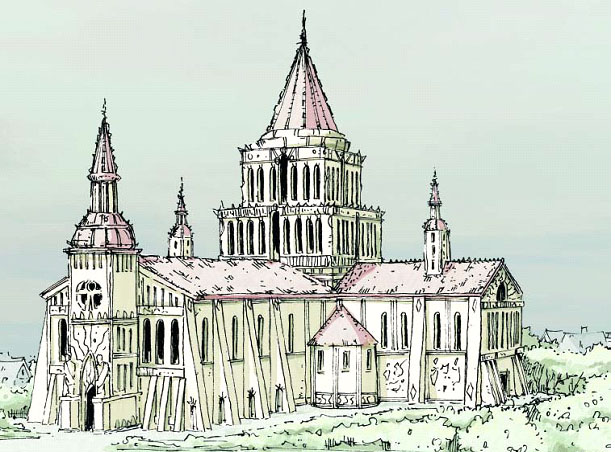
SESSION 20C: DOMINIC AND THE SILVER FATAR
April 27th, 2008
The 8th Day of Kadal in the 790th Year of the Seyrunian Dynasty
Tee returned to the Ghostly Minstrel and described the entire encounter to Dominic.
 Dominic was still uncertain, but Rehobath had seemed receptive and concerned… without the disturbing overtones of the letter they had found in the Foundry. Of course, the Reformists at the Temple of the Clockwork God had seemed nice enough, too. But Rehobath was giving answers… and Dominic was a priest of the Church.
Dominic was still uncertain, but Rehobath had seemed receptive and concerned… without the disturbing overtones of the letter they had found in the Foundry. Of course, the Reformists at the Temple of the Clockwork God had seemed nice enough, too. But Rehobath was giving answers… and Dominic was a priest of the Church.
“Will you come with me, Tee?”
“Of course!”
So the two of them quickly returned to the cathedral. Unlike Tee’s previous reception, they found themselves swept straight up to Rehobath’s office. He rose to greet them, but as Dominic meekly approached his desk the godwood suddenly flared to a bright light.
Rehobath stepped back, clearly shocked by the display. Fumbling his words for a moment, he suggested that they retire instead to the small seating area near the fireplace.
The three of them sat down. Rehobath, with an eager air, began by asking Dominic to show him the mark of Vehthyl. Dominic with a nervous, sidelong glance towards Tee murmured a prayer to Vehthyl:
Mighty, majestic, and radiant,
You shine brilliantly in the evening,
You brighten the day at dawn,
You stand in the heavens like the sun and the moons,
Your wonders are known both above and below,
To the greatness of the Magus,
To you, Vethyl, I pray!
As he finished, his eyes blazed with silver light. Rehobath was entranced. “It is the mark… It’s hard to believe that one of the Chosen should have come to me.”
Dominic had many questions, but there was much Rehobath didn’t know: Although he could confirm that Maeda was the “head priestess” of the Temple of the Clockwork God (confirming Dominic’s suspicions regarding the letter), he had no idea what the “Iron Angel” she mentioned in her letter might be.
However, Rehobath was able to confirm that Maeda had formed an alliance with the Shuul, who were led by a mysterious man known as Savane. The Shuul had apparently constructed most or all of the Temple of the Clockwork God.
Dominic was most interested, however, in knowing about what had happened to him. How or why had he been chosen by Vehthyl?
But, as Rehobath said, “The ways of the gods are filled with mystery… Vehthyl perhaps moreso than all the rest. To be chosen by them is to have your life placed in the focal point of creation. There is no way of knowing why you were chosen – only that, because you were chosen, you are an important person in an important place at an important time.”
This didn’t do much to give Dominic the guidance he was looking for, but then Rehobath said, “We may not know why Vehthyl has chosen you, but I suspect I know why you should have come to me now.”
“I was once the Gold Fatar of Athor. I served on the Council of Councils and was esteemed. When the last novarch died, it was clear to many that I was destined to follow him – to speak as the Living Voice of the Nine Gods. But when that time came, the Emperor played politics.” The last word was filled with venom. “Another was named in my place while I was stripped of my offices and sent here to serve as the Silver Fatar of an outer cathedral. It was the most blatant interference by the Emperor in the matters of the church since the Years of Heresy.”
Historical Note: The Years of Heresy began in 615 YD when the Emperor of Seyrun became the leader of the Imperial Church and called for a Time of Reflection. It later became known as the Purging. For five years a bloody, internal war was waged against heresy cults. When the Emperor was assassinated in 620 YD, church and state became separate once again and the Time of Reflection came to an end shortly thereafter.
“I believe that you can help me, Dominic. I believe that you were meant to help me.”
“What do you want me to do?” Dominic asked.
“Simply to let yourself be known. Your presence here in Ptolus is a sign. I would like to call a convocation in, let’s say, two days. Could you return here on the 10th?”
Dominic was hesitant, but he agreed. Rehobath then summoned in several members of the Order of the Silver God. The Order were the primary scholars of the Church here in Ptolus, and Rehobath wanted them to examined Dominic carefully and confirm the veracity of the mark. This they did – not only observing the glow of the eyes, but also testing its various properties (most particularly its ability to detect magical auras). When they were satisfied, priests escorted Tee and Dominic in honor to the front doors of the cathedral.














